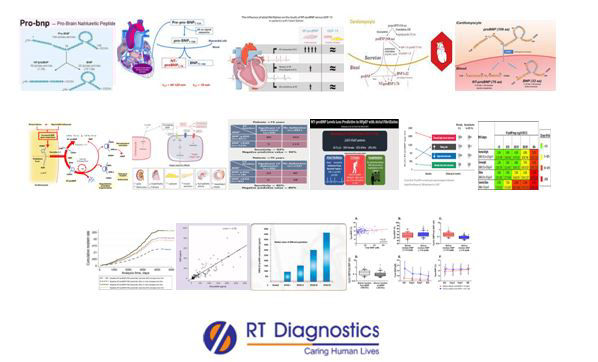Pro-BNP:
Why Pro-BNP Test ?
CLINICAL INFORMATION
B-type Natriuretic Peptide (BNP) is a peptide hormone, synthesized by the heart and larger blood vessels (helps in vasodilation of blood vessels – dilates arteries and veins), and it is also called ventricular natriuretic peptide or brain natriuretic peptide. The main function is to help maintain fluid balance (it reduces the production of various hormones that narrow the blood vessels such as adrenaline, angiotensin, aldosterone etc) and to regulate blood pressure. BNP is synthesized as pre-pro-BNP, encoded by the gene NPPB. This pre-pro-BNP (inactive) is then converted to Pro BNP (by enzymatic cleavage of 25 residues in the N-Terminal of the inactive peptide). This Pro-hormone is stored at the intracellular level as an O-linked glycoprotein. N-Terminal proBNP (NT-proBNP is a non-active prohormone) and biologically active BNP are secreted in the blood in equimolar amounts in response to changes in pressure inside the heart and excessive fluid volume accumulation in the blood vessels. Thus the pro-BNP test is vital in cardiac pathologies – cardiomyopathies (heart muscle diseases) including coronary syndromes (eg. in the diagnosis and assessment of the severity of heart failure etc). BNP is a hormone secreted by cardiomyocytes in the heart ventricles in response to stretching caused by certain abnormal conditions (such as intrinsic cardiac dysfunction or due to secondary causes such as pulmonary (pulmonary embolism), hepatic (prolonged fluid accumulation in liver may lead to cardiac cirrhosis) and/or renal diseases eg. chronic hypoxia etc) due to increase in the ventricular volume. Biologically when BNP is released in the body it binds to atrial natriuretic factor receptor NPRA and/or NPRB (to a lesser extent) and activates them. The ligand binding of BNP is similar to that of atrial natriuretic peptide (ANP), but the affinity of BNP to the receptor is 10 times higher as well as the half-life is much more when compared with ANP. After the biological role of these hormones, they are cleared from the bloodstream by the enzyme neutral endopeptidase (NEP) and is excreted in the urine. The physiological actions of BNP include a decrease in systemic vascular resistance (when the after-load is high) and central venous pressure (overall decrease in cardiac output is achieved due to reduced preload and improves cardiac ejection fraction, hence preventing cardiac hypertrophy), an increase in natriuresis (along with a substantial increase in diuresis – excretion of excess amount of water and salt from the body, when present in the circulatory system) etc. Lack of cardiac NPRA develops cardiac pathologies such as increased cardiac mass and fibrosis which may result in heart failure etc. Moreover, the Achilles heel of NT-proBNP overlaps with kidney disease in heart failure patients. Hence the estimation of the pro-BNP screening test helps as a marker aids in the diagnosis and prognosis of pathologies related to the heart i.e coronary syndromes (eg. left ventricular dysfunction, heart attack etc). Moreover, a pre-operative BNP can be used in health assessments, to predict the risk of an acute cardiac event (to diagnose or rule-out heart failure) during a cardiac or major vascular surgery. Therefore these test results are also vital since it is a reliable predictor of cardiovascular mortality (eg. congestive heart failure), preeclampsia (pregnancy), cardiogenic shock etc. Elevated levels of BNP (other than heart failure) are also found in cases related to renal diseases (in absence of heart failure), obesity etc, while lower levels of BNP is also found among obese people. This test is indicated in clinical manifestations of heart failure which include fatigue, nausea, loss of appetite, dyspnea (shortness of breath or difficulty in breathing), high BP or irregular heart rate, cough with white or pink phlegm, edema – swelling of legs, ankle, abdomen etc. If untreated, chronic conditions may lead to acute pulmonary edema, pulmonary embolism, DVT, stroke etc. Additional tests include CK, Troponin test, LDH etc. Other tests include ECG, ECHO, Imaging studies etc.

General Instructions:
Sample Requirement: Specimen - Blood sample collected from the vein. Test Preparation: None.
NOTE - Sample for specimen collections may vary based on the patient’s condition/cases according to the patient’s presenting complaints/signs or symptoms:
SPECIMEN REQUIREMENT (Special or Rare Cases) - As instructed and guided by Physician / Clinician / Pathologist / as per Laboratory’s requirements, according to procedures and protocols.
This Multi-Specialty Clinical Referral Laboratory RT DIAGNOSTICS provides precise and accurate tests with an extensive range of testing services to the medical centres to help in the diagnosis and identification of pathology in the test specimens for infectious diseases and also to evaluate the function of organ systems of the patient. It prevents further complications and helps to stabilize and restore health to near normalcy at the earliest without delay.



